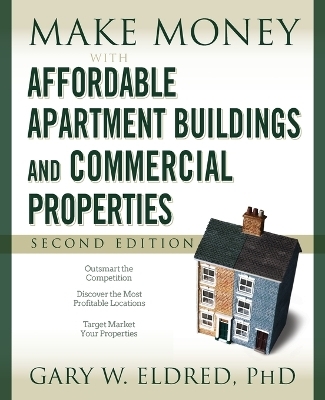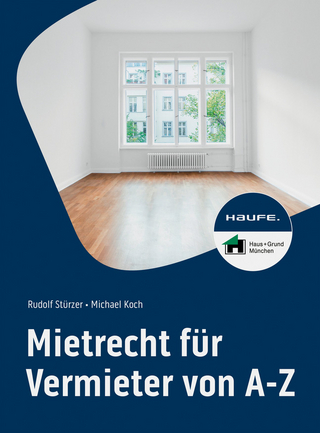
Make Money with Affordable Apartment Buildings and Commercial Properties
John Wiley & Sons Inc (Verlag)
978-0-470-18343-4 (ISBN)
Make Money with Affordable Apartment Buildings and Commercial Properties, Second Edition, shows you how to build wealth with affordable multi-unit residential and commercial buildings. Low-priced income properties can yield higher returns than single-family homes?especially if you manage them yourself. This book shows you how to find, assess, buy, and manage apartment buildings, retail offices, self-storage, and other overlooked investment alternatives. In today?s tough housing market, these properties offer great returns.
GARY W. ELDRED, PHD, has invested successfully in real estate for more than twenty-five years and has served on the graduate business school faculty at Stanford University and the University of Virginia. One of America's top-selling real estate authors, Eldred's other books include Investing in Real Estate, Fifth Edition, Trump University Real Estate 101, and Make Money with Flippers, Fixers, and Renovations, Second Edition, all from Wiley.
Acknowledgments xiii
Introduction: How to Start 1
Develop Your Analytical Abilities 1
Develop an Entrepreneurial Spirit 2
Uncommon, Yet Essential 2
Entrepreneurs Create Value for Themselves and Their Customers (a.k.a. Tenants) 3
Market Savvy: Systematic Strategic Thinking 5
1. Profit with Commercial and Multifamily Properties 7
Advantages of Commercial and Multifamily Properties 7
Cost of Acquisition 8
Cash Flows Relative to Price 9
Search Time 13
Management 14
Trade Up Tax Free 15
Owner Will Carry Financing (OWC) 17
Possibilities to Create Value 18
Summing Up 20
2. Craft Your Market Strategy 22
It All Depends 23
A Strategy of Your Own 23
PVP: The One Constant Rule 23
The DUST Strategic Framework: Questions to Answer 24
Entrepreneur Objectives: Know Thyself 26
Talents, Inclinations, and Resources 26
Assess Your Finances 28
Frame Your Due Diligence 30
Identify and Fully Describe the Physical Property 31
Understand Your Bundle of Rights and Restrictions 36
Where Should You Invest? 48
Time Period 49
3. Where’s the Local Economy Headed? 50
Economic Base Matters Greatly 51
Alamo, California (San Francisco Bay Area) versus Terre Haute, Indiana 52
Authors Neglect Economic Base 52
Benefit from the Lessons Learned 53
Where to Get Data 55
Will the Population Grow? 55
Enclaves of Existing and Potential Growth 55
Find Out the Actual Numbers 56
Beware of False Negatives 56
Is the Number of Jobs Increasing? 57
What Was the San Diego Connection? 59
Forecasting Recovery 59
Cost of Running a Business 60
Businesses and Employment Migrate to Lower-Cost Cities, States, and Countries 61
Cost of Living for Employees 61
Quality of Life 62
Quality of Life Also Attracts Wealth 63
Community Attitudes and Actions 64
Entrepreneurial Spirit 65
Concluding Remarks 66
4. Outperform the Competition 68
The Competitive Battle 69
Four Good Reasons to Inventory, Inspect, and Critically Review Competitors 69
Where to Invest 69
Market Information Gives You Negotiating Power and Confidence 71
Searching for a Preferred Value Proposition (PVP) 72
Constructing Your Financial Pro Formas 73
Identify Your Competitors 74
Quickly Adapt to Change 74
When Markets Tighten 75
More Practical Implications 75
What to Look For: The Location 76
Aesthetics 77
School Districts 77
Property Taxes and Services 78
Crime Rates 79
Accessibility 79
Trendiness 79
Public Transportation 80
Who Are the Residents and Recent Homebuyers and Tenants? 80
Site Features 81
The Exterior of the Building 81
Play the Tenant 82
Inspect the Interiors of Competing Units 83
Aesthetics: How Does the Unit Look, Feel, and Sound? 83
Livability: Unit Size, Room Count, and Floor Plan 84
Energy Costs 85
The Rental Process 86
5. Choose the Best Target Market 88
How to Create a PVP 88
Diversity Rules 89
Demographic Differences 90
Psychographic Differences 93
Avoid Standard Labels; Picture Your Actual Renters 98
Hitting the Bull’s Eye 100
Find Unique and Intense Needs 100
Bull’s Eye Lease Assessment 101
Throw Away Standard Operating Procedures 101
How Do You Identify the Wow (PVP)
Features for Your Tenants? 102
Informal Conversations 102
Pay Attention 103
Talk with Insiders and Experts 103
Use Questionnaires 104
Focus Groups 105
Anticipate and Adapt to Change 106
The Age Wave 106
Echo Boomers 107
Local Trends and Changes 108
6. Is the Property a Good Deal? 109
How Much Would It Cost to Construct the Property Today? 110
The Construction Cycle 110
Implications for Investors 111
Local (Regional) Recessions 113
Per Unit Measures 113
Per Apartment Unit 113
Per-Square-Foot Measures 115
Price Per Front Foot 117
Gross Rent Multipliers 117
Capitalized Value 118
Estimate Market Value 122
Anticipate the Future; Pay for the Present 124
Cash-on-Cash Return 125
Growth in Equity 127
Don’t Settle for Low Rates of Appreciation 129
7. Collect More Rents 130
Never Accept Average 131
Stand Out and Stand Above 131
A Strategy of Your Own 132
Verify Current Rent Collections 133
Examine All Leases and Rental Applications 134
Interpreting the Rental Information 134
Rent Collections, Not Rental Rates 135
Talk with Tenants 135
Your Competitive Market Analysis 137
Set Your Rents with Market Savvy 138
The Myth of Market Rent Levels 139
Rent Levels and Vacancy Rates 140
The Myth of the Market Vacancy Rate 141
Think Rent Range, Not Rent Rate 142
Raise Rents without Substantially Improving the Building 142
Confirm Your Suspicions 142
Why Owners Underprice Their Units 143
Investor Opportunities with Stage-of-Life Sellers 144
How High Can You Go? 146
Selective Increases 148
Dealing with Current Tenants 149
Can You Boost Your Rent Collections by Lowering Rents? 150
An Extreme Example of Overpricing and Market Ignorance (or Fanciful Dreaming) 150
A Purchase Opportunity 151
Time-Sensitive Rental Markets 152
8. Build Equity Fast with Sharp Interiors 153
The Entrepreneurial Imperative 153
Too Many Investors 153
Too Few Sellers 154
Not Words of Discouragement 155
Your Target Market 155
Visualize Your Tenants 156
Your Suggestion Box 157
Figuring Payback 157
Fast Buck versus the Last Buck 158
Set Your Budget for Improvements 158
The Sum Effect 160
The Interior of the Units 160
Sharpen the Aesthetics 161
Special Touches 163
Safety, Security, and Functionality 163
Rightsizing Room Count/Room Size 165
Create More Storage 167
Check Noise Levels 169
Overall Livability of the Unit 170
9. Generate More Income 171
Your Building Sends an Advertising Message 171
Clean Up the Grounds 172
Yard Care and Landscaping 172
Sidewalks, Walkways, and Parking Areas 173
Fences, Lampposts, and Mailboxes 173
The Exterior of the Building 174
Name Your Building 179
Signage 182
Curb Appeal: Summing Up 182
Collect More than Rent 183
Laundry 184
Parking 184
Build Storage Lockers 185
Cable/Satellite 185
Add Other Amenities or Services 186
10. More Creative Ways to Make Money 187
Tailor Your Lease Agreements 187
Competitive Advantage 188
What Terms Might You Negotiate? 191
Should You Furnish Your Apartments? 198
All Price Levels 199
High Payback 199
Warning: Don’t Pay a Premium Price for Furnished Apartment Buildings 201
Improve the Neighborhood 202
Become a Neighborhood Entrepreneur 203
The Huge Payback 204
Conclusion: Investing in Action: The Bayside Apartments 206
Entrepreneurial Strategy 212
Real Estate Entrepreneurs Outperform All Other Investors 213
Only Investors Perform 214
Entrepreneurial Real Estate Investors Perform Best of All 214
Index 217
| Reihe/Serie | Make Money in Real Estate |
|---|---|
| Zusatzinfo | Tables: 9 B&W, 0 Color |
| Verlagsort | New York |
| Sprache | englisch |
| Maße | 193 x 235 mm |
| Gewicht | 417 g |
| Themenwelt | Wirtschaft ► Betriebswirtschaft / Management ► Rechnungswesen / Bilanzen |
| Betriebswirtschaft / Management ► Spezielle Betriebswirtschaftslehre ► Immobilienwirtschaft | |
| ISBN-10 | 0-470-18343-8 / 0470183438 |
| ISBN-13 | 978-0-470-18343-4 / 9780470183434 |
| Zustand | Neuware |
| Informationen gemäß Produktsicherheitsverordnung (GPSR) | |
| Haben Sie eine Frage zum Produkt? |
aus dem Bereich


